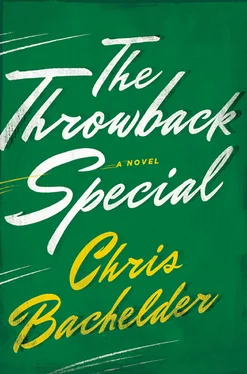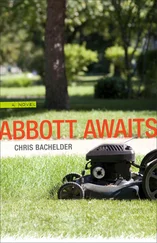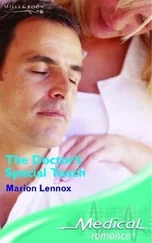“What are you looking for?” Trent said.
“What?” Gil said.
“What show are you looking for?”
“I don’t watch shows.”
“Then what do you watch?”
“I don’t care about individual programs,” Gil said. “That kind of vertical viewing doesn’t interest me.”
“What interests you?”
“This,” Gil said, continuing to cycle swiftly through the channels. “Holistic viewing.”
“I watch shows,” Trent said.
“Every channel, every show, is just part of one big show. Like every channel is a pixel, making up a larger picture, the big picture. I started watching like this, and I realized I was getting more and not really losing anything.”
“What does your wife think?” Trent said.
“She hides the remote,” Gil said. “But she’s not a horizontal processor. She doesn’t think that way. A lot of women don’t.”
“What about, like, cohesion?” Trent said. “Or suspense?”
“Suspense is an ancient value,” Gil said.
“Exactly,” Trent said. He steadied his wobbling laptop, and sent a message to the Fracture Compound about Gil’s horizontal viewing.
“I had an idea to program my remote to do it for me,” Gil said. “But then I realized I was thinking about it all wrong. Why alter the auxiliary technology when you could alter the primary technology? The ideal thing would be to have a dedicated channel, a station, that moved through all other channels at random. Horizon TV, I call it. I bet you could sell plenty of ad time because a thirty-second spot would seem, in contrast, like a vast narrative space. And you’d basically have zero production and development costs. No writers, no producers, no actors. But I couldn’t see a way to get past the lawyers.”
Trent chuckled, staring into his screen. “Hey, Gil,” he said, “I’ve got a mole in the Compound. Looks like George is walking on backs.”
“Oh, Jesus,” Gil said, rolling his eyes, though his own back had been walked on by George four years earlier, which had nearly precipitated a severe late-night breakdown. He remembered George’s feet clearly, the high arches. He remembered the weight, the struggle to find his breath. He kept flipping channels, but he wasn’t getting anywhere. He couldn’t concentrate, and totality was eluding him. He turned off the TV and pitched the remote onto the empty bed. Pitching a remote onto a large bed was a satisfying hotel activity, and Gil retrieved the remote so that he could do it once more.
“You know, here we are, the offensive line,” he said. “We’re paid to do one thing, protect the quarterback.”
“It was 1985,” Trent said. “So we aren’t paid all that much.”
“Counting Warren, there are six of us down linemen, right? And five of them coming on defense? There’s one thing we have to do, and we will just fail so bad at it.”
“Not you,” Trent said. “May is solid. Wait until you see the film.”
“But six against five.”
“The play call was terrible,” Trent said. “I don’t care what anybody says.”
“It’s a bad feeling, though,” Gil said. “Can you even imagine what those real guys must have been feeling like the night before?”
“They didn’t know it was going to happen, Gil.”
“But still,” Gil said.
“Hey, Gil,” Trent said, chuckling at his laptop screen. “George has got his magic flask out.”
Andy was gone, and Robert was in the bathroom, washing his hands and face. The bathroom fan obscured Gil’s infuriating television habits, to which Robert had been introduced in a previous year. He dried off with a thin towel, noticing as he often did the twin scars on the backs of his hands. He had received both injuries as a child. One was from a cigarette, one from hot coffee. As a child — seven years old, or eight — he liked to crawl beneath chairs and tables, particularly tables draped with tablecloths. He liked to be near his family but not with them. He liked the secrecy, the privacy. His parents were always telling him to get out from under there or he would get hurt. And that’s what had happened. His father dangled an after-dinner cigarette beside his chair, and the glowing tip pressed into the center of Robert’s hand. At some other point, perhaps a year later, he crawled out from beneath a table he had been told not to crawl beneath, jostling the leg and spilling a mug of hot coffee onto his other hand. It had been Robert’s fault, both times. His parents had not been cruel or punitive, but it was clear that they regarded the injuries as the child’s fault. They felt bad for Robert, and they cared for his wounds, but they did not feel culpable. After all, they had told him repeatedly not to crawl beneath things, and they had told him what would likely happen if he did. He did not listen, and it happened just as they said it would. And that was how Robert had always thought of the injuries, too. The scars were reminders of foolish things he had done. They stood for his folly and mischief. The accidents happened to occur during a generation when children could be at fault, and that era was long gone. If Robert’s hot coffee spilled onto his daughter, or worse, if he smoked cigarettes in the house and if one of his cigarettes burned the girl, he would clearly bear the burden of guilt and responsibility, regardless of whether he had warned her. The child’s scar would stand for his carelessness, his neglect. It’s not simply that he would feel it as censure from others (though he most certainly would); he would legitimately feel at fault. The child, doing childlike things, would be innocent. If you have children, you just don’t dare drink hot beverages. And if you are irresponsible enough to drink hot beverages, you don’t use an open-mouth mug, and you certainly don’t set the mug on a table, where it could be knocked to the floor, scalding your unsuspecting child, who is merely exploring her world in a trusting, innocent, curious way (their brains are like sponges!), and who could not be expected to heed admonitions in simple English to stay out from beneath the table. Robert could hold both verdicts in his mind — that his childhood injuries had been his own fault for crawling beneath a table he had been told not to crawl beneath, and that his own child’s heartbreaking (and hypothetical) burn injury beneath the table would also be his fault. Neither conclusion seemed to impinge on the other, a paradox rooted either in psychology or culture. Robert did not know which. There was no point in talking to Charles because he was never any help, and in fact he seemed uninterested.
Robert left the bathroom, and nearly bumped into Andy, who was just returning to the hotel room.
“Hi, Robert,” Andy said.
“Hi, Andy,” Robert said. He had always liked Andy, and he was not displeased to see him. Given the alternatives, he hoped they would be sharing a bed.
“Are you done in there?” Andy said.
“It’s all yours.”
Holding a pair of dripping shoes, Andy entered the bathroom, closed the door, and turned on the hair dryer attached to the wall.
FAT MICHAEL was not in the touchers’ room. Carrying a bottle of Advanced Water, a pack of antibacterial wipes, and his Theismann helmet, he had left the room without saying anything to Tommy and Myron. Tommy and Myron, though, could pretty well guess where he had gone.
The room, after the lottery, looked like a site of explosive violence. Pizza sauce streaked the walls, congealed bits of flesh-colored pizza lay strewn on the beds. The keg lay on its side, as if, once depleted of beer, it had perished. Having never seemed alive, it now resembled nothing so much as something dead. Crumpled napkins covered the floor like peach blossoms after the Battle of Shiloh. Tommy began to clean immediately, before Myron had an opportunity to ask or exhort him to clean. Tommy did not mind work, but he disliked being asked or told to work. If Myron had said to Tommy, “Let’s get this place cleaned up,” Tommy would have immediately become sullen and insolent, but if he could begin on his own initiative, he could labor assiduously. Myron, who also did not like to be asked or told to do work, immediately left the room to get a trash can before Tommy could ask him to go find a trash can. He found one in the vending alcove, which clicked and hummed. He had to step over the legs of a man from Prestige Vista Solutions, who sat on the floor, chanting lifelessly into his phone, “But that does not make any sense.” Myron filled the trash can while Tommy scrubbed the walls with a white washcloth that almost instantly turned pink. The activities began as a kind of race, but each man slowed as he realized that the race’s winner would be forced to clean the bathroom, an unpleasant task. The problem with doing your work fast was that you made more work for yourself. Myron finished first, but then left the room with his trash can, staying gone, Tommy thought, for a suspiciously long time. Tommy draped the keg with a towel, then trudged alone into the bathroom.
Читать дальше












